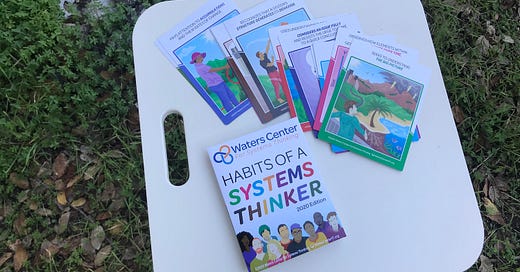Awe frees up the imagination to think about things we don’t know
and how we can understand them.
—Dr. Dacher Keltner
I mentioned briefly in my September 9 post Subtle Reminders of Connectedness that I was beginning an online course on Awe in Education with Dr. Dacher Keltner, professor of psychology at UC Berkeley and the director of the Greater Good Science Center. He is author of several books including Awe: The New Science of Everyday Wonder and How It Can Transform Your Life.
I’m slowly working my way through the course. In a module titled “Awe and Young People,” I was struck by one particular “awe practice” that Dacher recommended—Look for systems.
Here’s Dacher describing the practice.
...fundamental to experiences of awe is look for systems…you can listen to a bird song and then think about that song within the patterns of other bird song within a space and start to wonder, what is the purpose of that bird song? You can look at clouds, and there are whole studies of remarkable clouds, and look at their form and their changing dynamics and their color and their sense of the presence of water, and start to understand how that cloud is really part of a larger system. You can think about a student thinking about their family system and how that varies across different cultures. Some family systems are much more intergenerational, as opposed to other family systems, and start to understand how remarkable the systems of family are.
I’ve had a deep interest in systems thinking for many years, nurtured by great mentors. My dear friend and colleague Barbara Dawes Vogl (1924–2009) edited Patterns, the newsletter of the Systems Thinking and Chaos Theory Network (STCT) which was originally sponsored by The Association for Supervision and Curriculum Development (ASCD). Barbara introduced me to Bela H. Banathy, systems scientist and founder of the International Systems Institute.
Together Barbara and I attended several of Banathy’s innovative ISI design conversations, working through dialogue, in participatory design of education systems with fellow educators. Two of Banathy’s many books, Systems Design of Education: A Journey to Create the Future (1991) and Designing Social Systems in a Changing World (1996) have been an inspiration for much of my own work over the years.
I write this as background for why I appreciate the work of The Waters Center for Systems Thinking, especially their Thinking Tools Studio and Habits of a Systems Thinker cards and courses. I try to write The Reading Table once a month. I missed November so this is a roundabout introduction to The Reading Table—December. Yes, that’s the Habits of a Systems Thinker cards on my reading table—14 double-sided cards that you can find in a very user-friendly online version here.
The Waters Center describes the cards:
The Habits of a Systems Thinker help learners understand how systems work and how actions taken can impact results seen over time. They encompass a spectrum of strategies that foster problem-solving and encourage questioning.
This is my second deck of the cards…I had the original deck which I wrote about here in November, 2019 (the artwork in the 2020 edition is much improved).
What I didn’t know until diving deeper into the Thinking Tools Studio today is that they have an online course for each of the 14 cards. Here’s the page for the courses. (You’ll need to create a free account to view the content of each course.) I dove right in and did the short (30 mins) introductory “getting started” course titled “Beginning Your Systems Thinking Journey.”
In this introduction, the authors write:
Designed as a hands-on experience, each course highlights one of 14 Habits of Systems Thinking. The Habits of a Systems Thinker are the foundational building blocks that define and describe the practices of a systems thinker. Whether you want to develop your leadership capabilities, coaching or teaching expertise or your parenting skills, the intention is to provide a wide and relevant practice field. The Habits offer practical ways of thinking that inform action. They provide a framework to help you reflect on your strengths and identify areas of growth.
Circling back to Dacher Keltner and the awe practice for young people—Look for systems—I think the Waters Center Habits of a Systems Thinker cards can be a powerful tool to support the awe practice “Look for systems.” And for adults working with young people, awe practices, and the Habit cards, I think you’ll find the “Habits of a Systems Thinker” courses in the Thinking Tools Studio supportive in deepening your own understanding and practice.
Please share The Interconnect with an educator you love.
Look for systems. Take good care. Be well.




